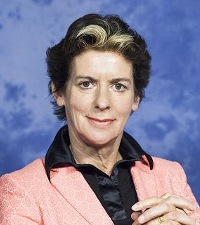
2015 Conference: Gerda Verburg
THE BUSINESS OF FOOD SECURITY:
Profitability, sustainability and risk
10-12 August 2015

| Home Program & Presentations Sir John Crawford Memorial Address Conference Scholars Sponsors Media |
SPEAKERSHer Excellency Gerda Verburg
Ms Verburg was a Member of Parliament for the Christian Democratic Alliance (CDA) from 1998 to 2007 and again from 2010 to 2011. She has also been a member of the Executive Board of the National Federation of Christian Trade Unions (CNV) and an entrepreneur. In her first period in the Dutch House of Representatives her portfolio included social affairs and development cooperation. She was also Vice-President of the House of Representatives and deputy leader of the CDA parliamentary party. In 2010-2011 she chaired the Permanent Parliamentary Committee on European Affairs and was CDA spokesperson on economic affairs, energy and innovation policy. No more business as usual for food security and nutrition: our shared responsibility To produce 70% more food by 2050 to feed the expected 9 billion people, it can’t be business as usual. We simply don’t have the energy or water to sustain such an increase. A world without hunger is within our reach if we are smarter in the way that we use the resources, tools, and technology available to us, and if we are willing to move away from working in silos and embrace a crosscutting and multi-stakeholder approach. There is growing global attention/recognition on the need to transform agriculture and food systems. The way to do this means that each and every stakeholder must play their role and at the same time open up to collaboration with other stakeholders—from big companies, to family farmers, advocacy organizations, research institutions etc. The Committee on World Food Security (CFS) and the World Economic Forum’s New Vision for Agriculture, are leading the charge on this transformation by bringing together governments, private sector actors, civil society representatives, leading research organizations, financing institutions and many others in order to contribute to the birth of a diversity of solutions to feed the 1 billion people still living in extreme poverty and the 2 billion suffering from malnutrition. Now more than ever, as we are set to agree on the SDGs, exploring how we can intensify our existing collaboration and expand the opportunities to build on each other’s strengths is necessary if we are to be successful at bridging the projected annual investment deficit of $2.5 trillion. Addressing food security and nutrition has at times been a minefield of polarizing debates, when in fact the best solutions are often found when we can combine and build on ideas and options from across the spectrum. Not shying away from addressing contentious issues in a multi-stakeholder dialogue, like—the role of genetic engineering, or the role for smallholders in intensification, how to optimize land use, or how we can combine traditional knowledge with innovation and technology—is the only way to build consensus and truly create food systems, where sustainability and profitability are inextricably linked.
|

 Since 1 July 2011 Ms Gerda Verburg has been the Netherlands’ Permanent Representative to the UN food organisations in Rome (the FAO, WFP and IFAD. She was elected Chair of the Committee on World Food Security (CFS) in October 2013, and since 2014, is also chairing the Global Agenda Council on Food and Nutrition Security of the World Economic Forum. From 2007 to 2010 she was the Dutch Minister of Agriculture, Nature and Food Quality. In 2007-2008 she was Chairperson of the UN Commission on Sustainable Development (CSD). CSD’s theme that year was agriculture, food security and climate change; it reached a broad consensus on these issues, thus laying a basis for the elaboration and implementation of policy on climate-smart agriculture.
Since 1 July 2011 Ms Gerda Verburg has been the Netherlands’ Permanent Representative to the UN food organisations in Rome (the FAO, WFP and IFAD. She was elected Chair of the Committee on World Food Security (CFS) in October 2013, and since 2014, is also chairing the Global Agenda Council on Food and Nutrition Security of the World Economic Forum. From 2007 to 2010 she was the Dutch Minister of Agriculture, Nature and Food Quality. In 2007-2008 she was Chairperson of the UN Commission on Sustainable Development (CSD). CSD’s theme that year was agriculture, food security and climate change; it reached a broad consensus on these issues, thus laying a basis for the elaboration and implementation of policy on climate-smart agriculture.